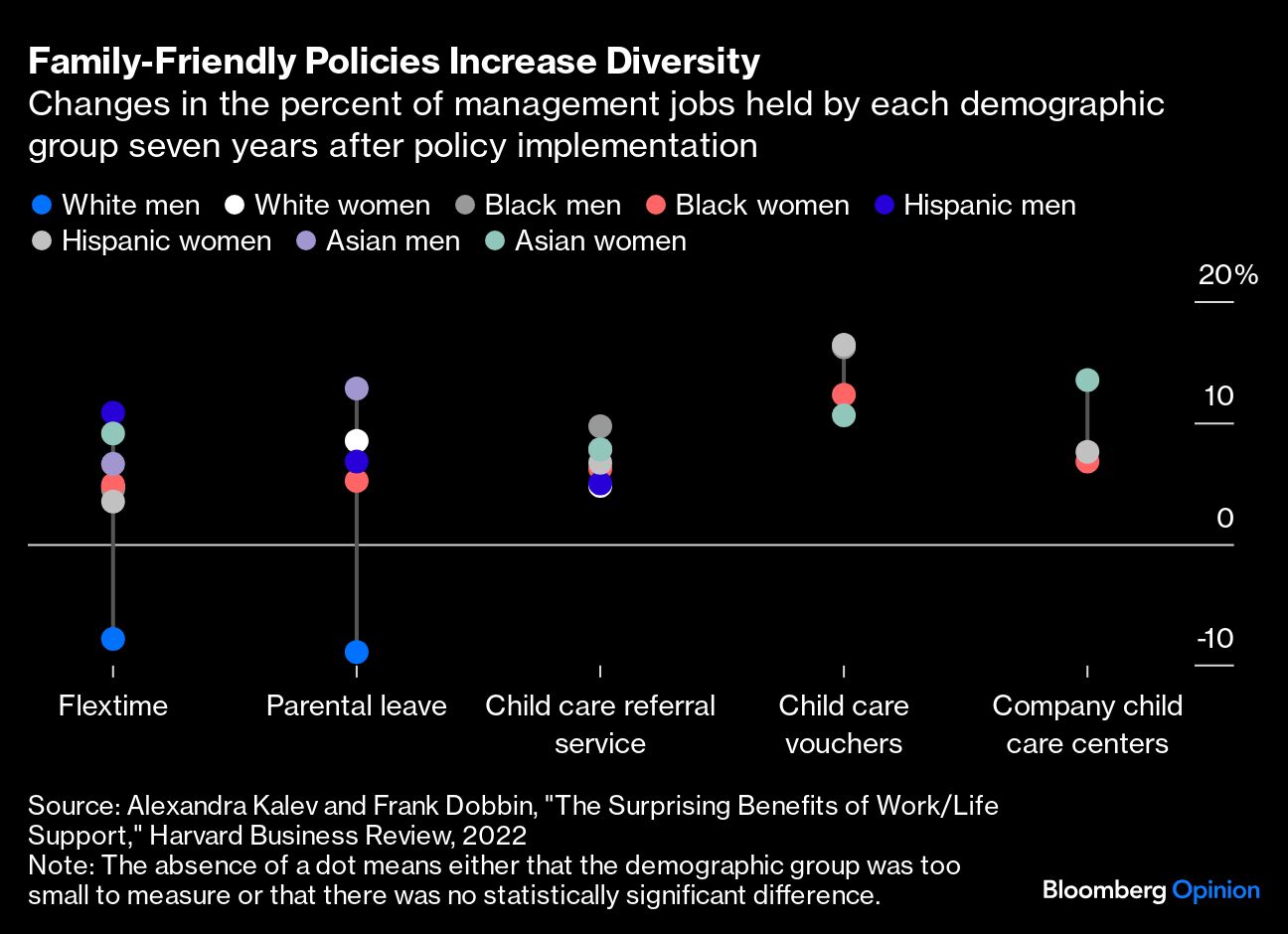(Bloomberg Opinion/Sarah Green Carmichael) — There's little doubt now that DEI departments are under threat. More than 30 states have introduced laws restricting diversity, equity and inclusion initiatives at state universities and government offices. In the private sector, layoffs have hit DEI offices particularly hard, suggesting that when push comes to shove, chief executives saw them as expendable — or even, following the litigious efforts of right-wing activists, a liability.
But the fight for a level playing field is far from over; after all, White women and people of color make up 65% of entry-level employees, but just 43% of senior management roles. That's not because White men are so disproportionately qualified or uniquely suited to leadership.
So what are leaders to do if they want to create more equality of opportunity in their organization? Aren't there some ways to make workplaces fairer without becoming a target for lawsuits from anti-woke warriors like Stephen Miller and Edward Blum?
I don't want to imply that DEI goals aren't valuable or worth defending. They obviously are. But the most widely adopted DEI policies, like grievance policies and mandatory bias training, haven't done a whole lot to achieve those goals.
Moreover, most executives aren't spoiling for an ugly political fight. They just want to create the kind of level playing field that lets more people thrive. Fortunately, there are lots of ways to do that. "A lot of the stuff that works isn't specifically DEI programming," says Frank Dobbin, a sociologist at Harvard.
Take mentoring, something most employees say they'd love more of. Dobbin, with coauthor Alexandra Kalev of Tel Aviv University, has done research that shows introducing a formal mentoring program can increase the share of women and minorities in management by 10%. And to be clear, that's not a special mentoring program for minorities or women — that's a mentoring program that's open to all employees. Why the disproportionate impact? Because in the absence of such a program, women and racial minorities may be less likely to receive formal mentoring from executives with the power to advance their careers. And even when a program is open to all employees, women and minorities are often the first to sign up.
Or look at family-friendly benefits like child care vouchers, on-site child care and parental leave. These are popular with all employees, but as Dobbin and Kalev explained in Harvard Business Review in 2022, they can make a bigger difference to women and people of color. After surveying over 800 US firms, Dobbin and Kalev found that the introduction of such policies were associated with the recruitment, retention, and promotion of significantly more White women and people of color.
For example, seven years after the introduction of child care vouchers, 16% more management jobs were held by Black men and Hispanic women, on average. Seven years after the introduction of parental leave, almost 13% more management jobs were held by Asian men.

Why would introducing these benefits, which are also popular with White men, have such a big impact on other groups? One reason is that White women and people of color are more likely to be single parents, explain Dobbin and Kalev. These groups also earn less money on average, meaning a thinner cushion for dealing with such emergencies and a harder time affording the luxury of reliable care. When a company introduces child care benefits, it affords greater career stability to everyone. And that stability, in turn, gives a wider array of people a chance to climb the ladder.
We can see something similar at work with flexibility. As is clear from the tug-of-war over return-to-office, there are plenty of White men who value the flexibility afforded by working from home; college-educated men are even a bit more likely to work fully remotely than college-educated women. But valuing flexibility isn't the same as needing it.
Simply put, the flexibility offered by remote and hybrid work has been a game-changer for mothers of young children. In a 2023 paper by Emma Harrington and Matthew Kahn, "Has the Rise of Work-from-Home Reduced the Motherhood Penalty in the Labor Market?" the researchers find that remote work substantially increases the share of mothers in employment. They saw the biggest changes in high-paying jobs and in occupations like finance that have historically been family-unfriendly, Harrington told me.
To be clear, working dads also value this flexibility — but the introduction of remote work hasn't had anything like the same impact on their employment status.
That's true even when work is hybrid rather than fully remote. However, fully remote jobs may provide other benefits.
Consider another group that falls under the DEI umbrella: people with disabilities. As companies got used to hiring remote workers during the pandemic, people with disabilities began to flood into the workforce.

Fully remote jobs can also help companies recruit from a more diverse geographic pool. In yet another study, this one by Wharton professors David Hsu and Prasanna Tambe, when tech startup jobs offered jobs as fully remote instead of fully in-person, employers witnessed a 33% increase in underrepresented minority applicants and a 15% rise in female applicants. Women tend to be the "trailing spouse" in a couple, whose location is determined by her husband's job — something that can hamper her career prospects. And many tech startups are headquartered in cities like San Francisco and Boston that are expensive and not known for being especially racially diverse.
Benefits like family-friendly policies and location-flexible work arrangements may not, on their own, be enough to fully level the playing field. But they do help make organizations more meritocratic. And I highly doubt even the most committed anti-woke warrior is going to file a lawsuit over any of them.





